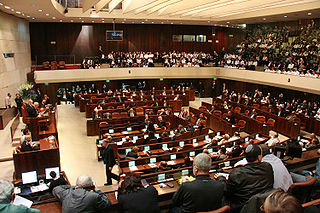Constitution
Israel and political and economic power

Despite the trappings of democracy – universal suffrage and periodic multiparty elections – the people of Israel have virtually no influence on the policies of their Government. The Government, consisting of party leaders, has rendered Israel’s parliament, the Knesset, a mere cipher. Why is this so?
Democracy in Israel: politics…
Voters in Israel cast their ballots not for individual Knesset members but for a party. A Knesset member owes his position to his party and not to the votes of constituents. So he cannot readily influence the Government’s policies as do legislators in all democratic systems of government. This prevents him from blocking Government policies he deems unwise or pernicious. If he votes against the head of his party he commits political suicide. (This is why Knesset votes of no-confidence are exercises in futility.)
Conversely, the citizen has no representative in the Knesset to uphold his interests and convictions vis-à-vis the Government. Once the Government is formed, a Prime Minister can ignore his most solemn campaign pledges with impunity, a common occurrence in Israel.
To overcome this undemocratic concentration of political power, the Foundation for Constitutional Democracy, an American-Israel research organization, proposed the adoption of a new Constitution. This prescribes, inter alia, constituency elections for members of parliament. This will give the voter and his elected representative a degree of power utterly lacking under Israel’s present system of government.
…and economics
This democratization or diffusion of political power must parallel a democratization or diffusion of economic power. State socialism dominates Israel. Cabinet ministers appoint the directors of about one hundred public corporations (and not necessarily on the basis of merit). More to the point, economic power concentrates in the Histadrut, i.e. the General Federation of Labor. The Labor Party dominates this organization. The Histadrut is not merely an expanded version of a labor union. It embraces agricultural settlements, cooperative societies, urban workers groups, the Sick Fund, and Bank Hapoalim (the “Workers Bank”). It also encompasses schools, cultural organizations, and corporations such as the Solel Boneh construction firm.
The Histadrut answers to a self-perpetuating oligarchy. Its all-powerful Executive Committee draws its membership from a system of indirect elections. That system renders the leadership independent of the rank-and-file, i.e. the worker.
The worker in this socialist system is merely a wage-earner, as he would be under a capitalist economy. Whether he will derive from his labor a “living wage” depends primarily on others. He can no more influence the decisions of the economic elite than of the political elite. (And when the Labor Party is in power, these two elites interlock.)
Can privatization help?
To diffuse economic power, Prime Minister Benjamin Netanyahu advocates “privatization.” The predominant method of privatization today is first to select state-owned enterprises and then seek out existing investors, whether foreign or domestic, who can afford to purchase assets or shares of these enterprises. However, most people have little or no savings to invest. Unless the government gives shares away free or at discounts below their fair market value, financing privatization through existing savings pools automatically channels most of the future ownership of these divested enterprises to economically privileged groups or foreign interests. This can recreate the conditions which encourage state domination of the economy. Privatization may thus replace one set of elites with another. Nor is this all.
Unless privatization is properly orchestrated, most people will still have to rely for their subsistence exclusively on wages and on the redistribution of other people’s income by government taxation. It so happens, however, that technological advances and the mobility of capital in an increasingly globalized economy can play havoc not only with wage-earners, but with corporations and even nations.
Indeed, “labor saving” technology, together with lower wage markets (for example, Asia), diminish the relative economic value of human labor vis-à-vis capital or the means of production. Thinking computers will increasingly replace people and millions of jobs in many industries and offices. More and more people will find it difficult to gain an adequate income from wages or welfare. (One consequence of this trend, that is, of a “wage-based” economy, is that more and more mothers will have to find work outside the home to make ends meet.)
A new kind of homesteading?
According to lawyer-economist Norman Kurland, “simply raising [the worker’s] wages is often not only impractical, but can be unjust as well…. It may force a company to downsize, relocate its operations, or go out of business.” To prevent the worsening gap between the rich and the poor, Kurland proposes structural reform of basic economic institutions (e.g. capital credit, banking, and taxation) to promote economic empowerment and sustainable growth through broad-based capital ownership.
His proposed “Capital Homestead Act,” which is addressed to the limitless frontier of high technology, upgrades the wisdom of Lincoln’s homestead legislation of 1862, which democratized ownership of America’s once abundant but finite land frontier. Among the “social tools” advanced are Employee Stock Ownership Plans (ESOPs) which Kurland and his mentor, the late Louis O. Kelso, pioneered in the 1960s:
Democratizing access to capital credit [to be repaid by future savings and company profits] would enable workers to acquire ownership of income-producing assets in new or expanding or in the divestiture of state-owned or Histadrut-owned enterprises and land. Property income could then supplement income from wages.
Also, faster rates of non-inflationary growth linked to expanded capital ownership would serve to overcome the resistance of (Histadrut) workers. It would answer their fears that privatization will destroy their job security, subsidized wages, and other benefits and offer little or nothing in exchange.
Kurland heads the Center for Economic and Social Justice in Arlington, Virginia. He is the world’s leading authority on expanded capital ownership plans. Thousands of such plans exist in the United States (for example, United Airlines). Whether ESOPs and other expanded ownership strategies can play a significant role in Mr. Netanyahu’s “privatization” policy is worthy of serious consideration; for whereas socialism fosters envy, capitalism (via unqualified privatization) fosters greed.
Summing up
Democratization in Israel requires a diffusion of both political and economic power. This can be accomplished by the Constitution proposed by the Foundation for Constitutional Democracy supplemented, where relevant, by an “Economic Democracy Act” that enables workers to supplement their wages by income-producing assets. To learn how to accomplish the latter, contact the Center for Economic and Social Justice in Arlington, Virginia.☼
-

 Civilization4 days ago
Civilization4 days agoThe Minnesota Insurrection
-

 Civilization4 days ago
Civilization4 days agoSupreme Court Orders CA Dems To Justify Prop 50 Maps
-

 Education3 days ago
Education3 days agoFree Speech Isn’t Free and It Cost Charlie Kirk Everything
-

 Civilization3 days ago
Civilization3 days agoThe Campaign Against ICE Is All About Open Borders
-

 Executive3 days ago
Executive3 days agoWaste of the Day: U.S.-Funded International Groups Don’t Have to Report Fraud
-

 Executive4 days ago
Executive4 days agoWaste of the Day: How the Grinch Stole $30,000
-

 Executive2 days ago
Executive2 days agoWaste of the Day: Throwback Thursday – Monkeys Throw Poop, And $600K
-

 Civilization2 days ago
Civilization2 days agoThe Battle for the Arctic Runs Through Greenland

